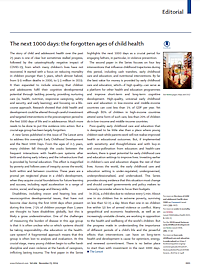Lancet series: Early Childhood Development and the Next 1000 Days
This two-part Lancet series on early childhood development focuses on the transition to the 'next 1,000 days' of the life course (between 2 and 5 years). The authors of this Series show that early childhood care and education programmes, as well as parenting, cash transfers, and early childhood nutrition programmes are particularly effective at supporting child growth and development in this age range.Paper 1 describes why this developmental period matters, identifes the environments of care, risks, and protective factors that shape children’s development, estimates the number of children who receive adequate nurturing care, and examines whether current interventions are meeting children's needs.
Paper 2 focuses on the cost of inaction and the implications of not investing in the next 1000 days. In low-income and middle-income countries (LMICs), only 62 million children aged 3 and 4 years (25·4%) currently receive adequate nurturing care during the next 1000 days, leaving 181·9 million children exposed to risks that jeopardise their healthy development.
Related links:
• Editorial - The next 1000 days: the forgotten ages of child health
• Paper 1 - The next 1000 days: building on early investments for the health and development of young children
• Paper 2 - The cost of not investing in the next 1000 days: implications for policy and practice
• Comment - The first and next 1000 days: a continuum for child development in early life
• Launch event
• Article in The Conversation
Author: Draper, Catherine E et al.
Year: 2024
Language: English, Arabic, French, Spanish
Web links:
Paper 1: https://www.thelancet.com/journals/lancet/article/PIIS0140-6736(24)01389-8/fulltext
Paper 2: https://www.thelancet.com/journals/lancet/article/PIIS0140-6736(24)01390-4/fulltext





